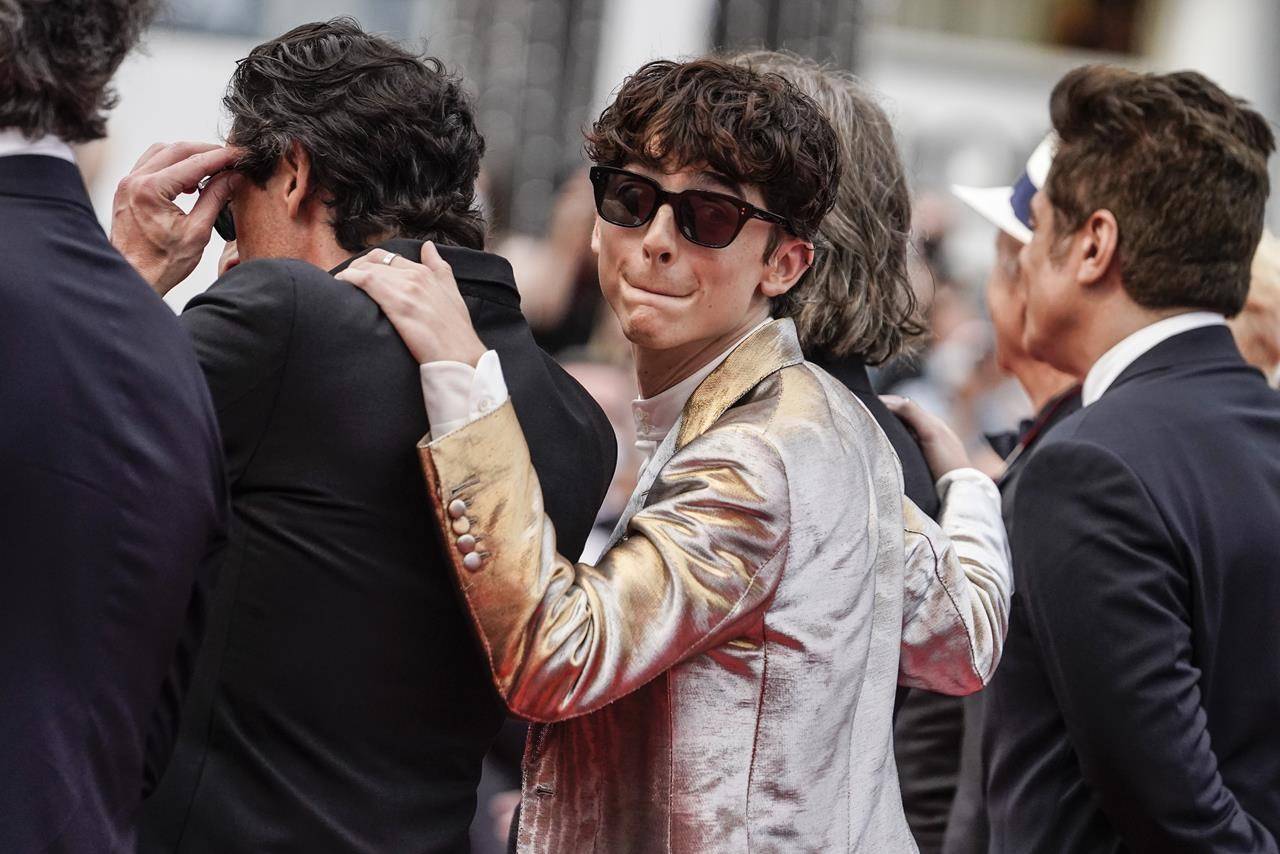By Morgan Gabereau

Benedetta: It was sweltering on the Croisette this past week, where perennial bad boy and octogenarian Dutch director Paul Verhoeven (Robocop, Basic Instinct) returned to crank it up a few more notches. It’s hard to know what to say about Benedetta. Predictably controversial, the opening act teeters into campy B-movie territory and then slyly shifts from gratuitous eye candy to subversive and substantive social history. Both loved and loathed, one thing is for sure: Verhoeven still knows how to push buttons.
Having drawn gasps here in 2016 with his last outing, Elle, Benedetta is set in the plague-ridden 17th century Tuscan town of Pescia, where a very young Benedetta Carlini joins a convent and quickly begins working her miracles. Starring Virginie Efira, Benedetta is a sexy, blood-soaked evisceration of church hierarchies, superstitions, social chaos, political lust, and envy. Benedetta has no qualms about shaking up the sisterly order by providing sanctuary to and slinking around with a newly arrived and abused homeless woman. If titillating, historical bodice-rippers with a quasi-intellectual cover are your thing, then this may be right up your alley.

The Worst Person in the World: On the other hand, if a contemporary drama with a strong-willed, yet selfish and insecure female lead character is to rule the roost this year, then Joachim Trier’s third instalment of his Oslo trilogy is definitely a contender for the Palme d’Or. In this refreshingly au courant take on the romance genre, Julie is a 30-something woman having a hard time finding her place in life. A hyper-intelligent medical student and wannabe photographer who works in a book shop, Julie meets and moves in with Aksel, a 45 year-old outspoken and controversial cartoonist. Restless and impatient with herself and in her relationship, Julie leaves Aksel’s latest book launch. While aimlessly drifting through the streets of Oslo, she crashes a wedding party, where she meets the hunkalicious (and married) Eivind. Their chemistry is instantaneous, sharing an animal-like intimacy without succumbing to “cheating.” Julie is a serious but skittish intellectual, distracted by omnipresent social media— she copes with life in episodes, having to reconcile with her own quirky and wayward tendencies. Exploring themes of freedom, commitment, desire, and fidelity, The Worst Person in the World is a topnotch candidate for an English version remake.

Flag Day: Based on a true story, Minnesota-set (and Manitoba-shot) Flag Day is actor/director Sean Penn’s take of drifter and grifter John Vogel’s memoir about his relationship with his dysfunctional family and, in particular, with his daughter Jennifer, played by Penn’s real-life daughter, Dylan. As a child, Jennifer marvelled at her father’s magnetism and ability to make life a grand adventure. Moments of carefree love and joy eventually give way and reveal his secret life as a bank robber and forger. Jennifer struggles to heal the wounds from her past, while rebuilding her relationship with her pathological liar and compulsive con man father. Penn’s performance is compelling, and he maintains his mantle as one of America’s foremost actors. However, like John Vogel, Penn is unsuccessful at eliciting anti-hero empathy, while Jennifer (Dylan) succeeds in overcoming her dysfunctional and disjointed upbringing.

Blue Bayou: Blue Bayou is a timely and heartbreaking story about immigration, identity, and family. Writer-director-actor Justin Chon (Gook, Ms. Purple) plays tattoo artist and devoted family man Antonio LeBlanc, looking to build a better life for his pregnant wife Kathy (Alicia Vikander) and his precocious stepdaughter Jessie in New Orleans. An ex-con with a checkered past, money is always tight for Antonio, especially with a new baby on the way. Complicating matters is Kathy’s ex, Ace, a Louisiana cop who wants to play a larger role in Jessie’s life,despite having abandoned the girl and her mother years earlier. When a family spat unexpectedly leads to a grocery store confrontation with Ace, Antonio is arrested and transferred into the custody of Immigration and Customs Enforcement (ICE). Despite having been brought to America at the age of three, the Korean-American adoptee—who is married to an American citizen—suddenly faces deportation from the only country he’s ever known as home. Trapped in a waking nightmare, Antonio and Kathy seek out legal assistance to help fight the deportation order, only to discover that they have precious little hope of keeping their family together. Determined to remain near his loved ones, an increasingly desperate Antonio is forced to confront his past, going to ever greater lengths to remain on American soil.

The French Dispatch: Fans of Wes Anderson won’t be disappointed, although I was, somewhat. The French Dispatch is an homage to the literary periodical, where we find ourselves in Ennui-sur-Blasé, France, by way of the publishing mecca of Liberty, Kansas. Seamlessly mixing French and English, anything and everything is lost in translation. An absurdist adventure into existential editorial-ism, Anderson’s trademark graphic novel tableau aesthetic features one of the strongest ensemble casts in recent memory with commanding and revealing performances from Léa Seydoux, Benicio del Toro, Adrien Brody, and Tilda Swinton, although others like Ed Norton and Luke Wilson seem forlorn and underutilized.
Despite lush sets and sumptuous visuals, confusion reigns in this taut yet sometimes meandering and convoluted story of artists and intellectuals. Although immensely seductive, this iteration doesn’t seem to pack the same laugh-out-loud punch as The Grand Budapest Hotel or Isle of Dogs. I love Anderson’s films in all their madcap tracking shots and sliding set choreography, but I am longing for more of the shattering emotion of The Royal Tenenbaums or The Darjeeling Limited. Everything is delivered and directed in exemplary fashion, yet somehow, the whole feels less than the sum of its parts.

Drive My Car: After winning the Silver Bear at this year’s Berlinale with Wheel of Fortune and Fantasy, Japanese director Ryûsuke Hamaguchi returns to Cannes with his Haruki Murakami-inspired Drive My Car in Competition. Garnering lavish praise from top critics, Hamaguchi is a serious contender for the Palme d’Or.
Yusuke Kafuku, a stage actor and director, is happily married to Oto, a screenwriter. However, Oto suddenly dies, leaving behind a secret. Two years later, Yusuke, still unable to fully cope with the loss of his wife, receives an offer to direct a play at a theatre festival and drives to Hiroshima. There, he meets Misaki, a reticent woman assigned to become his chauffeur. As they spend time together, Yusuke confronts the mystery of his wife that quietly haunts him.

Shorts: In the often-overlooked yet “ones to watch” category, the Semaine de la Critique competitive shorts programme premiered on Sunday.One short in particular stands out. Lili Alone by Shanghai and Los Angeles-based director Zou Jing explores the cold transactional detail of the life of a young village woman who moves to the city and is coerced into becoming a surrogate mother to make ends meet. It is a devastating indictment of contemporary Chinese society and the ruthless capitalistic ethic of human trafficking.

30 Years Later— JFK Revisited: Through the Looking Glass: Thirty years after his film JFK, whose director’s cut was also screened on the Cinema de la Plage this week, Oliver Stone’s new documentary updates the assassination storyline with recently declassified files. There are two and four-hour versions, although only the former screened here in Cannes. Narrated by Whoopi Goldberg and Donald Sutherland, with interviews of historians and witnesses as well as medical, forensic, and ballistic experts, Stone revisits compelling evidence that America’s biggest murder mystery was and remains a coherent conspiracy. The film further pieces together theories and evidence that US intelligence agencies manufactured and manipulated conditions to enable and ensure the removal of the establishment threatening Kennedy. The first half largely reviews familiar facts and reinforces arguments; however, it really gets going when it delves deeper into the “why” of the Kennedy assassination. The extent of the establishment’s desire to keep the military industrial complex humming along by removing Kennedy is explored with more of a geopolitical and societal impact perspective. In other words, professed pacifists don’t fund wars. Stone said on the red carpet: “At high noon, they blew his brains out in full public view. This was a very big message.”

30 Years Later— La Double Vie de Véronique: Indulge me for a moment, if you will. I first attended the Festival de Cannes in 1991. While I’d had the odd film job up to then, this was a quantum immersion into the global film industry. With dazzling sunshine, super creative artists, and marvellous movies, the place oozed substance and frivolity. I was a goner.
One film in competition that year was Krzysztof Kieślowski’s La Double Vie de Véronique starring Irène Jacob, who won the best acting award for her performance. Prior to seeing the film, I had been living in Paris and in the autumn of 1990, in the wake of the fall of the Berlin Wall, toured around Western and Eastern Europe, including a visit to the town of Krakow, Poland, where, alongside Paris, the film is set.
La Double Vie de Véronique is a masterpiece of serendipitous encounters, ambiguous motivations, saturated earth tones, and dank European torment. Veronika lives in Krakow and Véronique lives in Paris. They don’t know each other but they have parallel lives that are mysteriously interlinked. Naturally talented, Veronika gets a place in a music school, works hard, falls in love, and then tragically collapses and dies onstage during her first performance. At this point, Véronique’s life in Paris similarly pivots, without rationale, into a dreamy, heightened awareness of the brevity and precariousness of life.
The Cinematheque Française is preparing a full Kieślowski retrospective beginning this autumn.
Morgan Gabereau is a writer and filmmaker based in London and Vancouver.
